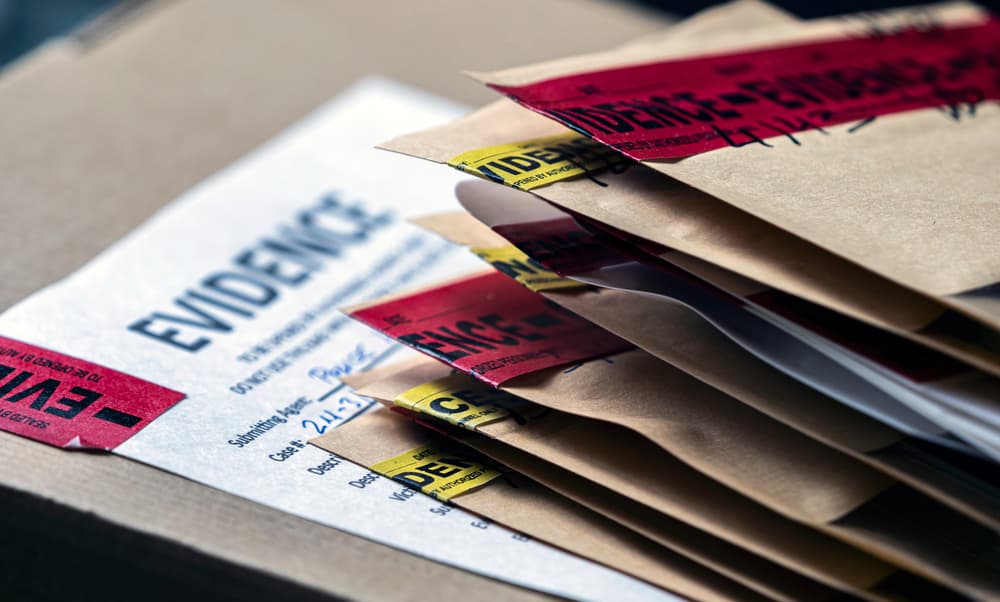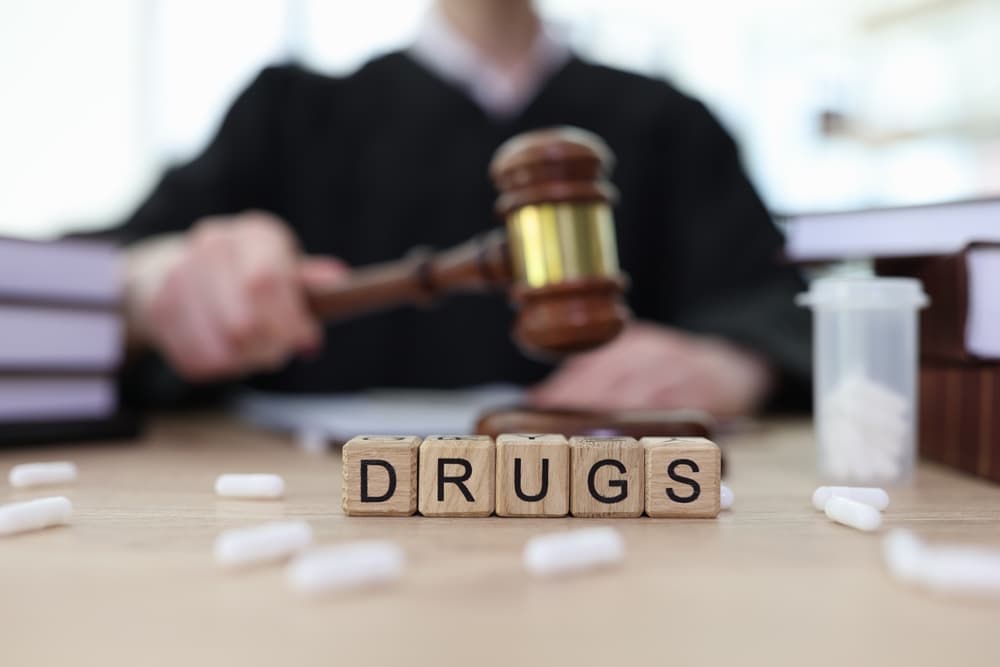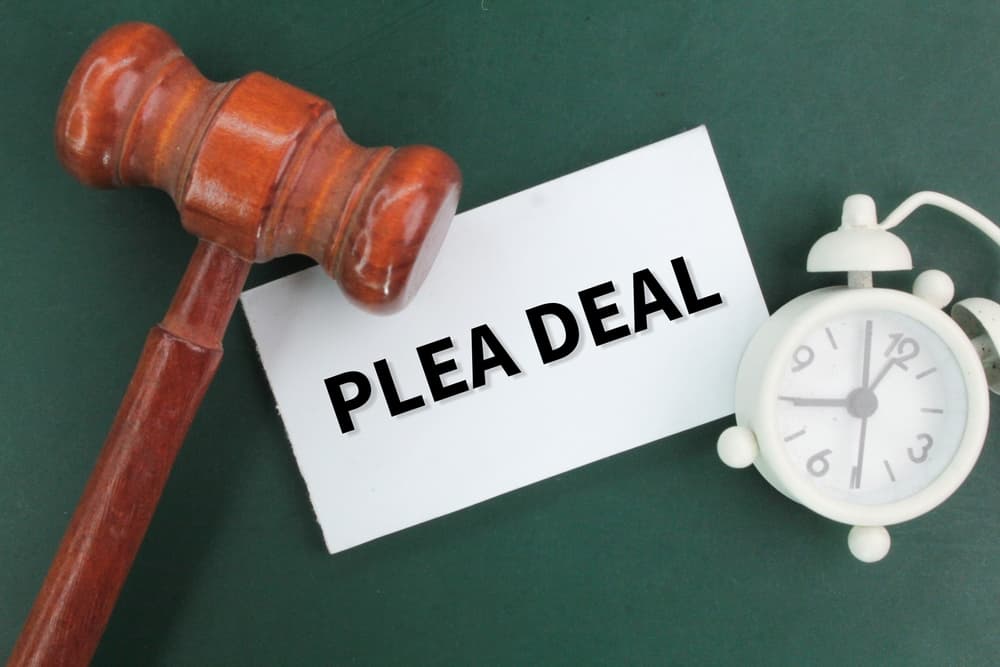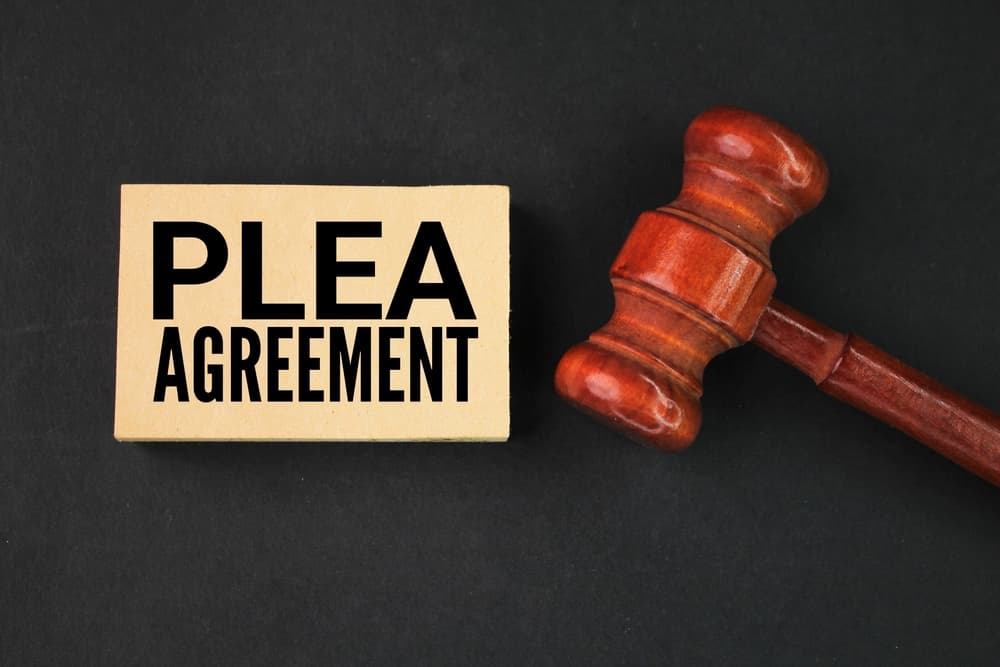April 8, 2025
One of the most significant decisions you must make after an arrest on drug charges is whether to consider or reject a plea. You’ll make this decision based on legal principles and procedures. Most importantly, never make this decision without advice from an experienced drug defense attorney.
A drug defense lawyer often negotiates a plea agreement with the prosecution. Doing so saves time and improves the outcome of a drug case when a defendant faces jail time.
By working with a lawyer, you might resolve your case more favorably.
Schedule a Free Initial Consultation
What is a Plea Bargain?
A plea bargain, also called a plea agreement, is a negotiation between the prosecutor and the defense in which the defendant pleads guilty or no contest to a lesser charge or a reduced sentence in exchange for the prosecutor dropping more serious charges.
This avoids the time, expense, and uncertainty of a trial.
In drug cases, the volume of cases and the potential sentence lead to many plea bargains.
The Prosecutor’s Job
The prosecutor’s job is to get a conviction. They assess the strength of their case, evidence, and potential penalties. In drug cases, prosecutors may offer plea bargains to streamline the process, manage their caseload, and get a conviction, even for a lesser charge.
The Defense Attorney’s Role
The defense attorney’s job is to protect the rights of the accused and get the best defense. They evaluate the evidence, investigate the case, and advise their client on the strengths and weaknesses of their defense.
When a plea bargain is offered, the defense attorney must carefully consider the terms and advise the client on whether to take it.
What to Consider When Evaluating a Plea Bargain
Evaluate a plea bargain in a drug case based on:
Strength of the Prosecution’s Case

One of the most important things is the strength of the prosecution’s case. If it has solid evidence against you, you may want to plea bargain instead of going to trial.
The evidence may include:
- Physical Evidence: Drugs, paraphernalia, and other items seized during the arrest can prove your guilt.
- Witness Testimony: Statements from law enforcement officers, informants, and other witnesses may increase jail time.
- Forensic Evidence: Lab results confirming the type and quantity of drugs might extend the sentence.
- Surveillance Footage: Video or audio recordings of the alleged offense may leave no doubt of your guilt.
Penalties
Understanding the penalties is key. Drug charges have different penalties based on the type and quantity of the drug, prior convictions, and other factors.
Penalties may include:
- Jail/Prison: Time.
- Fines: Money.
- Probation: Supervised release with conditions.
- Drug Treatment Programs: Mandatory rehab.
- Driver’s License Suspension: Loss of driving privileges.
- Criminal Record: A conviction that can impact future opportunities.
Mitigating Factors
Mitigating factors can reduce the charge or sentence.
These may include:
- First-Time Offender: No prior criminal record.
- Addiction: Showing you’re seeking treatment.
- Cooperation With Law Enforcement: Providing information or assistance to investigators.
- Minor Role in the Offense: You were involved minimally or under duress.
Prior Criminal Record
A defendant’s prior criminal record affects the plea bargain process. Those with previous drug convictions often face harsher penalties and fewer plea offers. Prosecutors are less likely to offer good deals to repeat offenders.
Type of Drug
The type and quantity of the drug involved play a significant role in the charge and penalties. Different drugs have different schedules and penalties.
For example, drug scheduling includes the following categories:
- Schedule I Drugs: Drugs with high potential for abuse and no accepted medical use, like heroin and LSD, have the harshest penalties.
- Schedule II Drugs: Drugs with high potential for abuse but some accepted medical use, like cocaine and methamphetamine, also have significant penalties.
- Schedule III, IV, and V Drugs: Drugs with lower potential for abuse and accepted medical uses have less severe penalties.
The quantity of the drug is also a significant factor. More drugs mean trafficking charges that have mandatory minimums in punishments.
Legal Defenses

You should explore legal defenses before taking a plea.
Possible defenses may include:
- Illegal Search and Seizure: Evidence obtained in violation of the 4th Amendment.
- Entrapment: Law enforcement induced you to commit a crime you wouldn’t have otherwise committed.
- Lack of Possession: You may dispute ownership or control of the drugs.
- Mistaken Identity: You didn’t break the law.
Legal fees, expert witnesses, and court costs can add up quickly. A plea bargain might cost you less in time, money, and stress.
When to Take a Plea
In several situations, you may wish to take a plea.
Overwhelming Evidence
If the prosecution has strong evidence, including physical evidence, witness testimony, and forensic results, the defendant may wish to take a plea. A plea can avoid a conviction on more serious charges and a harsher sentence.
Mandatory Minimums
Drug trafficking charges often have mandatory minimums, meaning a judge must sentence a specific minimum of time regardless of mitigating circumstances. In those cases, you may prefer a plea to a lesser charge that doesn’t have a mandatory minimum.
First-Time Offender
First-time offenders may be offered favorable plea bargains, like probation or drug treatment, in exchange for a guilty plea. Alternatives can prevent the creation of a criminal record and incarceration.
Mitigating Factors
If your case involves significant mitigating factors, like addiction or cooperation with law enforcement, a prosecutor might offer a reduced charge or sentence in a plea.
Financial Constraints
The cost of legal representation, expert witnesses, and court fees can exceed what you can pay. A plea might cost you less.
When to Decline a Plea
Despite the benefits, you may prefer to decline a plea.

Weak Case
If the prosecution based its case on weak or poor evidence, the defendant might have a good shot at winning at trial. Declining a plea and going to trial might result in an acquittal or dismissal.
Constitutional Violations
If the defendant’s constitutional rights were violated during the arrest or investigation, such as an illegal search and seizure, declining a plea and challenging the evidence in court might get you a better result.
Too Harsh
If the plea is too harsh or disproportionate to the crime, the defendant should decline plea bargaining. The prosecution should offer fair and reasonable plea terms.
Innocence
If the defendant believes they are innocent and the charges are false, they should consider declining the plea bargain and asserting their right to a trial. Pleading guilty to a crime they didn’t commit can have long-lasting consequences.
Strong Legal Defenses
If the defendant has strong legal defenses, like entrapment or mistaken identity, they should consider declining the plea bargain and presenting their defense at trial.
The Plea Process
The plea process typically goes like this.
Negotiation
Negotiations between the prosecutor and the defense attorney can start at any point in the case. The defense attorney may initiate the negotiations or respond to an offer from the prosecutor.
Offer and Counteroffer
When the prosecutor makes an offer, the defense attorney can accept, reject, or counteroffer. Negotiations can continue until both sides of the legal process agree.
Agreement
Once an agreement is reached, the lawyers write the agreement. Defendants must understand and agree to the terms before signing the plea agreement.
Court Hearing
The parties present the plea agreement to the judge in court. The judge reviews the agreement, makes sure the defendant understands their rights and the consequences of pleading guilty, and accepts or rejects the plea.
Sentence
If the judge accepts the plea bargain, the judge sentences the defendant according to the terms of the agreement.
Consult with a Criminal Defense Lawyer
Deciding to take or decline a plea bargain in a drug case is a significant decision. It requires considering many factors, including the strength of the prosecution’s case, the penalties, mitigating factors, and legal defenses.
Consulting with an experienced criminal defense attorney is key to understanding the options and making an informed decision. Every case is unique, and what’s suitable for one person might not be good for another.
By thoroughly evaluating all the facts and understanding the consequences of a plea bargain, individuals can make the best decision for their circumstances. Speak to a drug defense lawyer about your drug case.


